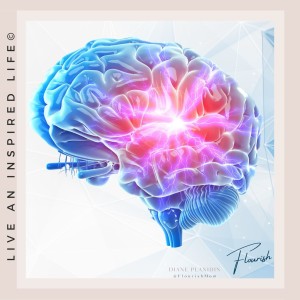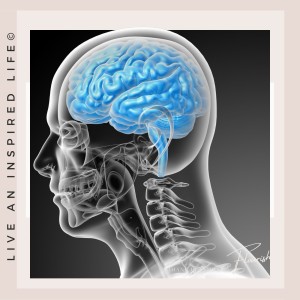
11.5K
Downloads
339
Episodes
I know that you believe in yourself, you believe in self-development and helping your children or those you influence live with a healthy mind, body and heart. For that, I applaud you. Live an Inspired Life and Flourish! The goal of this show is to help you not only raise healthy & happy children, but to also work on your own personal development. We are all born with a Gift. We are all born with Purpose. Life‘s journey is to hone and develop that Gift, as purpose changes within. Share your knowledge of self-empowerment with those you influence, after all it‘s easier to raise a child with a positive mindset than it is to fix a broken one. How you speak and how you act around your children becomes their inner voice. Once you have self-awareness it‘s easier to thrive and grow, be your child‘s inspiration and advocate for their well being. https://www.Flourish.Mom. #personaldevelopment #mindset #motivation #inspiration #successtips #selfesteem #parenting #Believe #selfhelp #goals #habits #timemanagement #success #selfcare #selflove #bestseller #inspired #FlourishMom #time #howto #coach #personalgrowth #mentalhealth #health #fitness #wellness #meditation #spirituality #loa #thesecret #womenempowerment #parentingtips #highperformance #inspiredlife #inspireddiane #greatness #growth
Episodes

Tuesday Jun 28, 2022
Tuesday Jun 28, 2022
"He who knows others is wise; he who knows himself is enlightened" Lao Tzu.
Today is all about rising above the crowd with confidence!
Comparison is inevitable in our lives, use it to move yourself forward towards excellence instead of envy.
What do you do to keep the momentum flowing?
Be rigorous! Be persistent!
Live an Inspired Life!
#LaoTzu #Empowerment #RobertGreene
Find out more about Flourish at the links below:
➡️ Facebook https://www.Facebook.Com/Flourish.Mom
➡️ Twitter: https://www.Twitter.Com/FlourishMom
➡️ Instagram: https://www.Instagram.com/FlourishMom
➡️ Pinterest: https://www.Pinterest.ca/WowFlourishMom
➡️ Watch on YouTube: https://youtu.be/rU20qpx3VRE

Tuesday Jun 21, 2022
Overcome Challenges for a Meaningful Life | Flourish with Diane Planidin
Tuesday Jun 21, 2022
Tuesday Jun 21, 2022
"Challenges are what make life interesting and overcoming them is what makes life meaningful." Joshua J. Marine
What is challenging you right now? I'm writing an exam today and needed a few words of encouragement to remind me to embrace the struggle, do my best so that I may reach my intentions.
What do you do to keep the momentum flowing?
Remember, you can't fail if you don't give up! Just keep moving forward and learning along the way.
Live an Inspired Life!
#Inspiration #Empowerment #Flourish
Find out more about Flourish at the links below:
➡️ https://www.Flourish.Mom
➡️ Facebook https://www.Facebook.Com/Flourish.Mom
➡️ Twitter: https://www.Twitter.Com/FlourishMom
➡️ Instagram: https://www.Instagram.com/FlourishMom
➡️ Pinterest: https://www.Pinterest.ca/WowFlourishMom
➡️ Watch on YouTube: https://youtu.be/Kado1INugrs

Sunday Jun 19, 2022
The Nervous System | Psych-100 | Chapter 19 | Flourish with Diane Planidin
Sunday Jun 19, 2022
Sunday Jun 19, 2022
The mammalian nervous system is a complex biological organ, which enables many animals including humans to function in a coordinated fashion. The original design of this system is preserved across many animals through evolution; thus, adaptive physiological and behavioral functions are similar across many animal species. Comparative study of physiological functioning in the nervous systems of different animals lend insights to their behavior and their mental processing and make it easier for us to understand the human brain and behavior. In addition, studying the development of the nervous system in a growing human provides a wealth of information about the change in its form and behaviors that result from this change.
The nervous system is divided into central and peripheral nervous systems, and the two heavily interact with one another. The peripheral nervous system controls volitional (somatic nervous system) and nonvolitional (autonomic nervous system) behaviors using cranial and spinal nerves. The central nervous system is divided into forebrain, midbrain, and hindbrain, and each division performs a variety of tasks; for example, the cerebral cortex in the forebrain houses sensory, motor, and associative areas that gather sensory information, process information for perception and memory, and produce responses based on incoming and inherent information. To study the nervous system, a number of methods have evolved over time; these methods include examining brain lesions, microscopy, electrophysiology, electroencephalography, and many scanning technologies.
Learning Objectives
-Describe and understand the development of the nervous system.
-Learn and understand the two important parts of the nervous system.
-Explain the two systems in the peripheral nervous system and what you know about the different regions and areas of the central nervous system.
-Learn and describe different techniques of studying the nervous system. --Understand which of these techniques are important for cognitive neuroscientists.
-Describe the reasons for studying different nervous systems in animals other than human beings. Explain what lessons we learn from the evolutionary history of this organ.
Live an Inspired Life!
#Psychology #QueensU #Nervous
Find out more about Flourish at the links below:
➡️ https://www.Flourish.Mom
➡️ Facebook https://www.Facebook.Com/Flourish.Mom
➡️ Twitter: https://www.Twitter.Com/FlourishMom
➡️ Instagram: https://www.Instagram.com/FlourishMom
➡️ Pinterest: https://www.Pinterest.ca/WowFlourishMom
➡️ Watch on YouTube: https://youtu.be/GZj39mrMny0
PSYC 100: Principles of Psychology F21 by PSYC100 is licensed under a Creative Commons Attribution-NonCommercial-ShareAlike 4.0 International License, except where otherwise noted.
Note: I am a student and not a teacher - I am sharing my learning journey with you!

Sunday Jun 19, 2022
Sunday Jun 19, 2022
As a generally noninvasive subset of neuroscience methods, psychophysiological methods are used across a variety of disciplines in order to answer diverse questions about psychology, both mental events and behavior. Many different techniques are classified as psychophysiological. Each technique has its strengths and weaknesses, and knowing them allows researchers to decide what each offers for a particular question. Additionally, this knowledge allows research consumers to evaluate the meaning of the results in a particular experiment.
Learning Objectives
- Learn what qualifies as psychophysiology within the broader field of neuroscience.
- Review and compare several examples of psychophysiological methods.
- Understand advantages and disadvantages of different psychophysiological methods.
Live an Inspired Life!
#Psychology #QueensU #Brain
Find out more about Flourish at the links below:
➡️ https://www.Flourish.Mom
➡️ Facebook https://www.Facebook.Com/Flourish.Mom
➡️ Twitter: https://www.Twitter.Com/FlourishMom
➡️ Instagram: https://www.Instagram.com/FlourishMom
➡️ Pinterest: https://www.Pinterest.ca/WowFlourishMom
➡️ Watch on YouTube: https://youtu.be/UpnXYl-c3aI
PSYC 100: Principles of Psychology F21 by PSYC100 is licensed under a Creative Commons Attribution-NonCommercial-ShareAlike 4.0 International License, except where otherwise noted.
Note: I am a student and not a teacher - I am sharing my learning journey with you!

Sunday Jun 19, 2022
Sunday Jun 19, 2022
The human brain is responsible for all behaviors, thoughts, and experiences described in this textbook. This module provides an introductory overview of the brain, including some basic neuroanatomy, and brief descriptions of the neuroscience methods used to study it.
Learning Objectives
- Name and describe the basic function of the brain stem, cerebellum, and cerebral hemispheres.
- Name and describe the basic function of the four cerebral lobes: occipital, temporal, parietal, and frontal cortex.
- Describe a split-brain patient and at least two important aspects of brain function that these patients reveal.
- Distinguish between gray and white matter of the cerebral hemispheres.
- Name and describe the most common approaches to studying the human brain.
- Distinguish among four neuroimaging methods: PET, fMRI, EEG, and DOI.
- Describe the difference between spatial and temporal resolution with regard to brain function.
Live an Inspired Life!
#Psychology #QueensU #Brain
Find out more about Flourish at the links below:
➡️ https://www.Flourish.Mom
➡️ Facebook https://www.Facebook.Com/Flourish.Mom
➡️ Twitter: https://www.Twitter.Com/FlourishMom
➡️ Instagram: https://www.Instagram.com/FlourishMom
➡️ Pinterest: https://www.Pinterest.ca/WowFlourishMom
➡️ Watch on YouTube: https://youtu.be/HP40bj2j7Ks
PSYC 100: Principles of Psychology F21 by PSYC100 is licensed under a Creative Commons Attribution-NonCommercial-ShareAlike 4.0 International License, except where otherwise noted.
Note: I am a student and not a teacher. This is my learning journey that I am sharing with you :)

Sunday Jun 19, 2022
Sunday Jun 19, 2022
Psychopharmacology is the study of how drugs affect behavior. If a drug changes your perception, or the way you feel or think, the drug exerts effects on your brain and nervous system. We call drugs that change the way you think or feel psychoactive or psychotropic drugs, and almost everyone has used a psychoactive drug at some point (yes, caffeine counts).
Understanding some of the basics about psychopharmacology can help us better understand a wide range of things that interest psychologists and others. For example, the pharmacological treatment of certain neurodegenerative diseases such as Parkinson’s disease tells us something about the disease itself.
The pharmacological treatments used to treat psychiatric conditions such as schizophrenia or depression have undergone amazing development since the 1950s, and the drugs used to treat these disorders tell us something about what is happening in the brain of individuals with these conditions. Finally, understanding something about the actions of drugs of abuse and their routes of administration can help us understand why some psychoactive drugs are so addictive. In this module, we will provide an overview of some of these topics as well as discuss some current controversial areas in the field of psychopharmacology.
Learning Objectives
- How do the majority of psychoactive drugs work in the brain?
- How does the route of administration affect how rewarding a drug might be?
- Why is grapefruit dangerous to consume with many psychotropic medications?
- Why might individualized drug doses based on genetic screening be helpful for treating conditions like depression?
- Why is there controversy regarding pharmacotherapy for children, adolescents, and the elderly?
Live an Inspired Life!
#Psychology #QueensU #Drugs
Find out more about Flourish at the links below:
➡️ https://www.Flourish.Mom
➡️ Facebook https://www.Facebook.Com/Flourish.Mom
➡️ Twitter: https://www.Twitter.Com/FlourishMom
➡️ Instagram: https://www.Instagram.com/FlourishMom
➡️ Pinterest: https://www.Pinterest.ca/WowFlourishMom
➡️ Watch on YouTube: https://youtu.be/DT--AJzSGuQ
PSYC 100: Principles of Psychology F21 by PSYC100 is licensed under a Creative Commons Attribution-NonCommercial-ShareAlike 4.0 International License, except where otherwise noted.
Note: I am a student and not a teacher. This is my learning journey that I am sharing with you :)

Sunday Jun 19, 2022
Sunday Jun 19, 2022
The goal of this module is to introduce you to the topic of hormones and behavior. This field of study is also called behavioral endocrinology, which is the scientific study of the interaction between hormones and behavior. This interaction is bidirectional: hormones can influence behavior, and behavior can sometimes influence hormone concentrations.
Hormones are chemical messengers released from endocrine glands that travel through the blood system to influence the nervous system to regulate behaviors such as aggression, mating, and parenting of individuals.
Learning Objectives
- Define the basic terminology and basic principles of hormone–behavior interactions.
- Explain the role of hormones in behavioral sex differentiation.
- Explain the role of hormones in aggressive behavior.
- Explain the role of hormones in parental behavior.
Provide examples of some common hormone–behavior interactions.
Live an Inspired Life!
Find out more about Flourish at the links below:
➡️ Facebook https://www.Facebook.Com/Flourish.Mom
➡️ Twitter: https://www.Twitter.Com/FlourishMom
➡️ Instagram: https://www.Instagram.com/FlourishMom
➡️ Pinterest: https://www.Pinterest.ca/WowFlourishMom
➡️ Listen to the Podcast: https://FlourishMom.podbean.com
PSYC 100: Principles of Psychology F21 by PSYC100 is licensed under a Creative Commons Attribution-NonCommercial-ShareAlike 4.0 International License, except where otherwise noted.
Note: I am a student and not a teacher. This is my learning journey that I am sharing with you :)

Sunday Jun 19, 2022
Neurons & Behavior | Psych-100 | Chapter 14 | Flourish with Diane Planidin
Sunday Jun 19, 2022
Sunday Jun 19, 2022
This module on the biological basis of behaviour provides an overview of the basic structure of neurons and their means of communication. Neurons, cells in the central nervous system, receive information from our sensory systems (vision, audition, olfaction, gustation, and somatosensation) about the world around us; in turn, they plan and execute appropriate behavioural responses, including attending to a stimulus, learning new information, speaking, eating, mating, and evaluating potential threats.
The goal of this module is to become familiar with the anatomical structure of neurons and to understand how neurons communicate by electrochemical signals to process sensory information and produce complex behaviours through networks of neurons. Having a basic knowledge of the fundamental structure and function of neurons is a necessary foundation as you move forward in the field of psychology.
Learning Objectives
- Differentiate the functional roles between the two main cell classes in the brain, neurons and glia.
- Describe how the forces of diffusion and electrostatic pressure work collectively to facilitate electrochemical communication.
- Define resting membrane potential, excitatory postsynaptic potentials, inhibitory postsynaptic potentials, and action potentials.
- Explain features of axonal and synaptic communication in neurons.
Live an Inspired Life!
Find out more about Flourish at the links below:
➡️ Facebook https://www.Facebook.Com/Flourish.Mom
➡️ Twitter: https://www.Twitter.Com/FlourishMom
➡️ Instagram: https://www.Instagram.com/FlourishMom
➡️ Pinterest: https://www.Pinterest.ca/WowFlourishMom
➡️ Watch on YouTube: https://youtu.be/znu3iiV-fP4
PSYC 100: Principles of Psychology F21 by PSYC100 is licensed under a Creative Commons Attribution-NonCommercial-ShareAlike 4.0 International License, except where otherwise noted.
Note: I am a student and not a teacher. This is my learning journey that I am sharing with you :)

Sunday Jun 19, 2022
Sunday Jun 19, 2022
When people think of emotions they usually think of the obvious ones, such as happiness, fear, anger, and sadness. This module looks at the knowledge emotions, a family of emotional states that foster learning, exploring, and reflecting. Surprise, interest, confusion, and awe come from events that are unexpected, complicated, and mentally challenging, and they motivate learning in its broadest sense, be it learning over the course of seconds (finding the source of a loud crash, as in surprise) or over a lifetime (engaging with hobbies, pastimes, and intellectual pursuits, as in interest).
The module reviews research on each emotion, with an emphasis on causes, consequences, and individual differences. As a group, the knowledge emotions motivate people to engage with new and puzzling things rather than avoid them. Over time, engaging with new things, ideas, and people broadens someone’s experiences and cultivates expertise. The knowledge emotions thus don’t gear up the body like fear, anger, and happiness do, but they do gear up the mind—a critical task for humans, who must learn essentially everything that they know.
Learning Objectives
- Identify the four knowledge emotions.
- Describe the patterns of appraisals that bring about these emotions.
- Discuss how the knowledge emotions promote learning.
- Apply the knowledge emotions to enhancing learning and education, and to one’s own life.
Live an Inspired Life!
#Psychology #QueensU #Emotions
Find out more about Flourish at the links below:
➡️ Facebook https://www.Facebook.Com/Flourish.Mom
➡️ Twitter: https://www.Twitter.Com/FlourishMom
➡️ Instagram: https://www.Instagram.com/FlourishMom
➡️ Pinterest: https://www.Pinterest.ca/WowFlourishMom
➡️ Watch on YouTube: https://youtu.be/qVDA5BrFVto
PSYC 100: Principles of Psychology F21 by PSYC100 is licensed under a Creative Commons Attribution-NonCommercial-ShareAlike 4.0 International License, except where otherwise noted.
Note: I am a student, not a teacher. I am sharing my learning journey with you!

Sunday Jun 19, 2022
Sunday Jun 19, 2022
Basic principles of learning are always operating and always influencing human behavior. This module discusses the two most fundamental forms of learning — classical (Pavlovian) and instrumental (operant) conditioning. Through them, we respectively learn to associate 1) stimuli in the environment, or 2) our own behaviors, with significant events, such as rewards and punishments.
The two types of learning have been intensively studied because they have powerful effects on behavior, and because they provide methods that allow scientists to analyze learning processes rigorously. This module describes some of the most important things you need to know about classical and instrumental conditioning, and it illustrates some of the many ways they help us understand normal and disordered behavior in humans.
The module concludes by introducing the concept of observational learning, which is a form of learning that is largely distinct from classical and operant conditioning.
Learning Objectives
- Distinguish between classical (Pavlovian) conditioning and instrumental (operant) conditioning.
- Understand some important facts about each that tell us how they work.
- Understand how they work separately and together to influence human behavior in the world outside the laboratory.
- Students will be able to list the four aspects of observational learning according to Social Learning Theory.
Live an Inspired Life!
Find out more about Flourish at the links below:
➡️ Facebook https://www.Facebook.Com/Flourish.Mom
➡️ Twitter: https://www.Twitter.Com/FlourishMom
➡️ Instagram: https://www.Instagram.com/FlourishMom
➡️ Pinterest: https://www.Pinterest.ca/WowFlourishMom
➡️ Watch on YouTube: https://youtu.be/QaRDQ1H7qOU
PSYC 100: Principles of Psychology F21 by PSYC100 is licensed under a Creative Commons Attribution-NonCommercial-ShareAlike 4.0 International License, except where otherwise noted.
Note: I am a student and not a teacher - I am sharing my learning journey with you!
